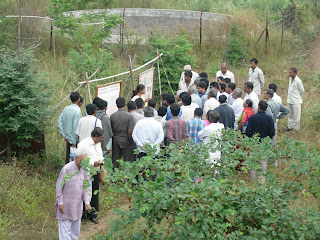Kapil Shah, Director and Founder Trustee, Jatan
The role of people who seek changes in society requires deep thinking. This is especially important in our globalizing world, where society is becoming more and more materialistic. Change seekers generally have one of two approaches: charity purposes or to enhance the capacities of society. Charity and relief are specially needed in situations of disasters or where the community is extremely poor. However, real and lasting change is possible if we work efficiently to enhance the capacity of the community to face present and future challenges, which could be social, economic or environmental. Such capacity can be enhanced through education – which I think is the only tool for this, and could be formal or informal.
At Jatan, the approach we are trying is to help people to anticipate and address their future environmental problems. The subject we have chosen is farming, and the focus is on organic farming, which we call ‘Sajiv Kheti’. Farming produces food, which is something that concerns everybody. So we address everybody; and the community we work with is really the public at large.
Today, the profession of farming is in a highly distressed state. An important reason is the degradation of our natural resources, which the farmer converts into farm produce. We decided to work with farmers and consumers to help them understand the links between natural resources, organic farming and health, and be the change makers.
Some people feel that learning is achieved only through formal ways, and if someone is “educated” through the formal school/ college system, he or she needs no further education. We believe that education is a continuous and lifelong process. Secondly, everyone needs to enhance their capacities to face challenges as they arise, and this capacity enhancement is a form of education or learning.
At Jatan, we interact with a cross section of society - school children come for practical lessons on organic farming; house wives learn about health and organic food; farmers learn why organic farming is required and how it can be practiced. We are working with agricultural scientists so that their work addresses the research needs in organic farming; even politicians and policy makers have to apply themselves to frame appropriate policies. Jatan’s mission to promote organic farming is in fact a mission of education, done through non-formal methods. By engaging in educational activities, we are ourselves learning more.
Jatan has used conventional tools such as farmers’ camps, seminars, newsletters, books, leaflets, exhibitions and films. But education can take forms that engage the mind, that interest a person and relate to a way of life.
For more information contact: Vinoba Ashram, Gotri, Vadodara, Gujarat, Pin - 390 021

Food festivals of organic products: About 50 volunteers from Vadodara, Rajkot and Bhuj participated in an organic food festival at various locations. Ready to eat food like pau-bhaji, kathaiwari dish and dal-bati were served fresh. The festival provided an opportunity to farmers for direct marketing and interaction with customers. One section was devoted to screening films and display books on environment, organic farming, naturopathy and sustainable development.

Farmer visit organic farms: For the past 10 years Jatan has been facilitating farmers visits to organic farms maintained by grassroot organisations both within and outside Gujarat like Deccan Development Society and Centre for Sustainable Agriculture in Andhra and Chetna Vikas seen here in the picture.





No comments:
Post a Comment